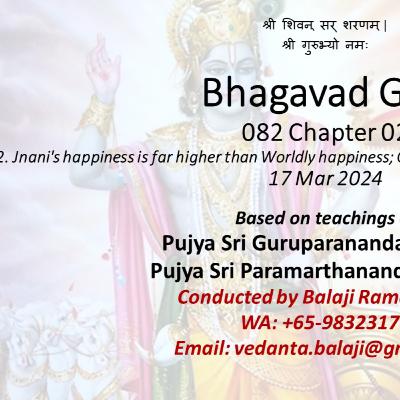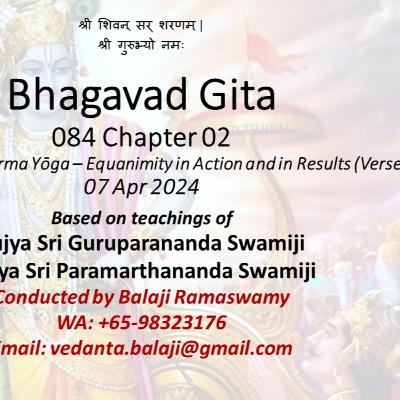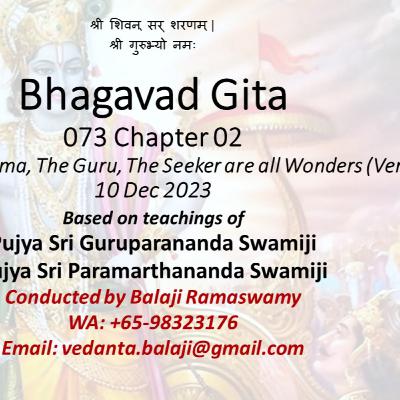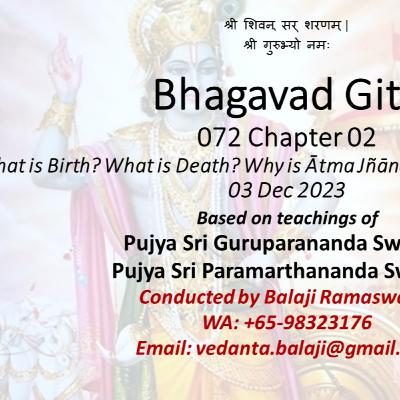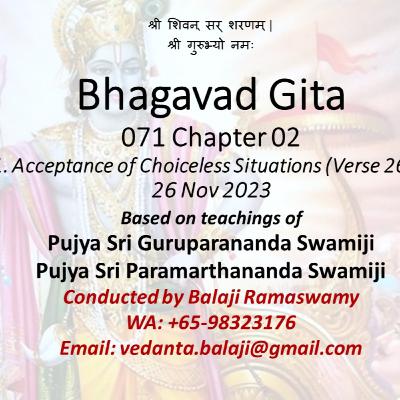Bhagavad Gita - Class 082 - Chapter 02 Slokas 46-47 - Jnani's happiness is far higher than Worldly happiness; Choice ONLY over Action - Class taken on 17 Mar 2024
Description
Chapter 02 - Sankhya YogaSloka 46 (Contd...) - Jnana gives immense & infinite happinessDoes a jnani need karma kanda of Vedas? If not, why?What example does Bhagavan give to explain that?Will a small pond of water be useful for any person who has access to a large ocean like body of fresh water?What utility will karma kanda of vedas provide to a jnani?Will Karma yoga be of any utility to a jnani?Does a spiritual seeker need karma kanda of vedas?Does a spiritual seeker need karma yoga?What does "Yāvān artah udapāne" mean?What does "sarvataḥ saṃplutodake" mean?How much benefit is available in a pond when there is a flood everywhere?What does "Tāvān Sarveṣu vedeṣu" mean?What does "vijānataḥ brāhmaṇasya" mean?How much benefit the entire vedas can provide a "wise brahmin"?What term is used to call a person who has done jnana yoga sadana in this sloka?What term is used to call a person who is in sattva guna in this sloka?Who is a brahmin according to Upanishads?What is one who lives a disciplined life according to Vedas and to understand Vedas called?From what standpoint does the term brahmana have to be taken in jnana kanda and from what standpoint in karma kanda?What term is used in this sloka to denote a person who has lived the life of karma yōga?Why does the Karma kanda not be of any use to a vijānataḥ?Does Karma kanda and karma yoga help a spiritual seeker?Sloka 47 - Principle of Karma YogaHow can this sloka be interpreted?What are the 2 types of action that we perform?Does Karma yoga talk about action or attitude?Can we call any specific action karma yoga sadana?Are there any actions that are not allowed in Karma yoga?Why is karma yoga called "buddhih yōga"?Why is it necessary to have knowledge about how the world operates?What can convince ourselves to have the right attitude?How is understanding of a person or object related to the attitude?How is devotion related to knowledge of Ishvara?Do we have a choice based on our actions?Does Bhagavan say we have a choice over results?What is the FACT of life? Do we even have a choice once we have performed the action?Can we say "I did the job with a particular desire in mind and hence the result should be as per my desire."?Can we alter the course of the result?What is the expectation that we have of the result and why is it wrong?What are the 3 choices of action?What does "Kartum shakyam", "Akartum shakyam", "Anyata kartum shakyam" mean?Why should we be judicious and use our intelligence before acting?Can we have an expectation of the results?Is it right to get a doubt that if I have a right to action but not to results, why should I even act?What are the 2 outcomes to any action?Is adrashta phalam visible?What are punya and papa?When we do "dānam" to someone, what is the drshta and the adrashta phalam?When we steal something from others, what is the drshta and the adrashta phalam?How does the invisible bhaavana (attitude) determine the invisible adrashta phalam?If someone is doing charity work, will we know the attitude or the motive behind it? If two people use the knife and a life is lost in both cases, how come one gets punya and the other papa?If results depend on adrashta bhāvana then why are there disparities between the attitude and the results for an action?When the results of an action come, does it not come ONLY based on the attitude shown when performing that action, or does it also depend on the mixture of the papa and punya that we had accumulated over so many previous actions?Why does even when we put a lot of effort and have good attitude, the result does not match the effort and the attitude?And why do sometimes we put in a little effort and yet we get good results?What should our position be when we do not have a choice or where there is no privilege?Why should we not let our attitude be driven by our desires, especially when the attitude decides the results?

